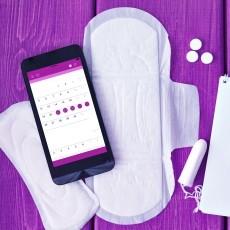Period pain, also known as dysmenorrhea, is a common experience for many women. This throbbing, cramping pain in the lower abdomen can be debilitating, often accompanied by lower back pain, nausea, diarrhea, and headaches. But Why Does Period Pain Hurt so much? This article explores the causes of menstrual cramps and offers insights into managing this monthly discomfort.
The Science Behind Menstrual Cramps
The primary culprit behind period pain is a group of hormone-like substances called prostaglandins. Prostaglandins are produced by the uterine lining and trigger uterine muscle contractions to help shed the lining during menstruation. Higher levels of prostaglandins are associated with more intense contractions and, consequently, more severe pain.
Primary Dysmenorrhea: Period Pain Without Underlying Cause
Most period pain falls under the category of primary dysmenorrhea. This means the pain isn’t caused by another medical condition. It typically begins a day or two before menstruation and lasts for a few days. The pain often lessens with age and after childbirth.
 Diagram of the female reproductive system highlighting the uterus.
Diagram of the female reproductive system highlighting the uterus.
Secondary Dysmenorrhea: Period Pain with an Underlying Cause
Secondary dysmenorrhea refers to period pain caused by an underlying medical condition affecting the uterus or other reproductive organs. Conditions like endometriosis and uterine fibroids can contribute to this type of pain. Secondary dysmenorrhea often starts later in life, worsens over time, and might persist even after your period ends.
Managing Period Pain: Finding Relief
While period pain is a common experience, there are ways to manage and alleviate the discomfort:
Home Remedies for Menstrual Cramps
Simple self-care measures can often provide relief from mild to moderate period pain:
- Heat Therapy: Applying a heating pad or hot water bottle to the lower abdomen can relax muscles and reduce pain.
- Exercise: Engaging in light exercise, such as walking or yoga, can increase blood flow and release endorphins, which have natural pain-relieving properties.
- Warm Baths: Soaking in a warm bath can help relax muscles and ease cramping.
- Relaxation Techniques: Practices like yoga and meditation can help manage stress, which can exacerbate period pain.
Over-the-Counter Pain Relief
Over-the-counter pain relievers, particularly nonsteroidal anti-inflammatory drugs (NSAIDs) like ibuprofen and naproxen, can effectively reduce period pain. NSAIDs work by inhibiting prostaglandin production.
When to Seek Medical Attention
While some period pain is normal, it’s crucial to seek medical attention if:
- Pain is Severe and Interferes with Daily Life: If over-the-counter pain relievers and home remedies don’t provide relief, consult a healthcare provider.
- Sudden Worsening of Cramps: A sudden increase in pain intensity could indicate an underlying issue.
- Severe Cramps After Age 25: Developing severe cramps for the first time after age 25 warrants medical evaluation.
- Fever Accompanied by Period Pain: Fever with period pain could signal an infection.
- Pain Persists Outside of Menstruation: Experiencing pelvic pain even when not menstruating requires investigation.
Diagnosis and Treatment of Severe Period Pain
Diagnosing the cause of severe period pain typically involves a medical history review, a pelvic exam, and possibly imaging tests like ultrasound. Laparoscopy, a minimally invasive surgical procedure, may be necessary to diagnose conditions like endometriosis.
Treatment for primary dysmenorrhea often involves hormonal birth control or prescription pain relievers. Treatment for secondary dysmenorrhea focuses on addressing the underlying condition, which might require medication or surgery.
Conclusion
Understanding the causes of period pain and available management options can empower women to seek appropriate care and find relief from this common discomfort. While mild period pain is often manageable with home remedies and over-the-counter medication, severe or persistent pain should be evaluated by a healthcare professional. Don’t hesitate to reach out to your doctor if you’re concerned about your period pain. They can help determine the cause and recommend the best course of treatment for you.